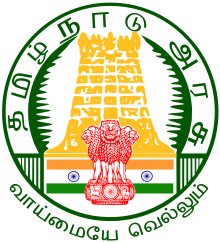
Tamil Nadu Legislative Council was the upper house of the former bicameral legislature of the Indian state of Tamil Nadu. It began its existence as Madras Legislative Council, the first provincial legislature for Madras Presidency. It was initially created as an advisory body in 1861, by the British colonial government. It was established by the Indian Councils Act 1861, enacted in the British parliament in the aftermath of the Indian Rebellion of 1857. Its role and strength were later expanded by the second Council Act of 1892. Limited election was introduced in 1909. The Council became a unicameral legislative body in 1921 and eventually the upper chamber of a bicameral legislature in 1937. After India became independent in 1947, it continued to be the upper chamber of the legislature of Madras State, one of the successor states to the Madras Presidency. It was renamed as the Tamil Nadu Legislative Council when the state was renamed as Tamil Nadu in 1969. The Council was abolished by the M. G. Ramachandran administration on 1 November 1986. In 1989, 1996 and 2010, the DMK regime headed by M. Karunanidhi tried to revive the Council. The former AIADMK regime (2016-2021) expressed its intention not to revive the council and passed a resolution in the Tamil Nadu Legislative Assembly in this regard.

The Government of Tamil Nadu is the administrative body responsible for the governance of the Indian state of Tamil Nadu. Chennai is the capital of the state and houses the state executive, legislature and head of judiciary.

The Government of Kerala, also known as the Kerala Government, is the administrative body responsible for governing Indian state of Kerala. The government is led by a chief minister, who selects all the other ministers. The chief minister and their most senior ministers belong to the supreme decision-making committee, known as the cabinet.

The Tamil Nadu Legislative Assembly is the unicameral legislature of the Indian state of Tamil Nadu. It has a strength of 234 members, all of whom are democratically elected using the first-past-the-post system. The presiding officer of the Assembly is the Speaker. The term of the Assembly is five years, unless dissolved earlier.

Edappadi Karuppa Palaniswami, often referred to by his initials E.P.S., is an Indian politician who is the current leader of opposition in the Tamil Nadu Legislative Assembly. He served as the seventh chief minister of Tamil Nadu, from 2017 to 2021. He has been the General Secretary of All India Anna Dravida Munnetra Kazhagam (AIADMK) since 28 March 2023. Previously, Palaniswami has served as the interim general secretary (2022–23), joint co-ordinator (2017–22) and headquarters secretary (2016–22) of AIADMK.
Local bodies in Tamil Nadu constitute the three tier administration set-up in the South Indian state of Tamil Nadu. It is a system of local government which forms the last level from the Centre. Chennai Corporation in the then Madras Presidency, established in 1688, is the oldest such local body not only in India but also in any commonwealth nations outside United Kingdom.
The Tamil Nadu Public Service Commission (TNPSC) is a department of the government of Tamil Nadu that is responsible for governing the recruitment of personnel into the state's public service. It is the successor of the Madras Service Commission, which came into being under an Act of the Madras Legislature in 1929 and was the first Provincial Public Service Commission in India. It adopted its current name in 1970. TNPSC operates under Articles 315 to 323 of Part XIV of the Constitution of India.

The Tamil Nadu Council of Ministers is the executive wing of the Government of Tamil Nadu and is headed by the State's Chief Minister M. K. Stalin, who is the head of government and leader of the state cabinet. The current state council of ministers were sworn in on 7 May 2021, following the 2021 Tamil Nadu Legislative Assembly election. The term of every executive wing is for 5 years. The council of ministers are assisted by department secretaries attached to each ministry who are from the Tamil Nadu cadre of the IAS. The chief executive officer responsible for issuing orders on behalf of the Government is the Chief Secretary to the State Government, with Thiru. Shiv Das Meena being the current holder of that position.

The Department of Energy of state of Tamil Naduis one of the departments of Government of Tamil Nadu. The department was established in 1993 and is responsible for the production and distribution of energy.

The Department of Agriculture and Farmers' Welfare one of the departments of Government of Tamil Nadu.

The Department of Co-operation, Food and Consumer Protection of state of Tamil Nadu is one of the departments of Government of Tamil Nadu.

The Department of Health and Family Welfare is one of the departments of Government of Tamil Nadu and is responsible for ensuring access to basic public health services in the state.

The Department of Higher Education is one of the departments of Government of Tamil Nadu. Established in 1997, the department is responsible for formulating policies and regulations for higher education in the state.

The Department of Law is one of the departments of Government of Tamil Nadu.

The Department of Highways and Minor Ports is one of the departments of Government of Tamil Nadu.

The Department of Rural Development and Panchayat Raj is one of the departments of Government of Tamil Nadu.

The Department of Transport of state of Tamil Nadu is one of the departments of Government of Tamil Nadu.

The Department of Finance is one of the departments of Government of Tamil Nadu. It is responsible for managing the public finances and presenting the budget of the state government.

The Department of Public is one of the departments of Government of Tamil Nadu.



